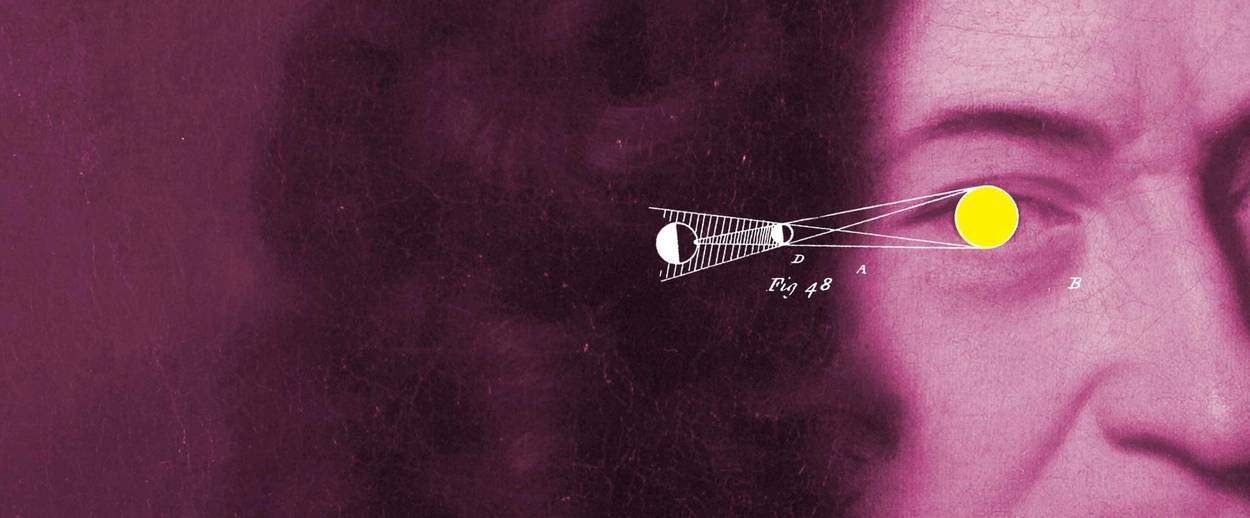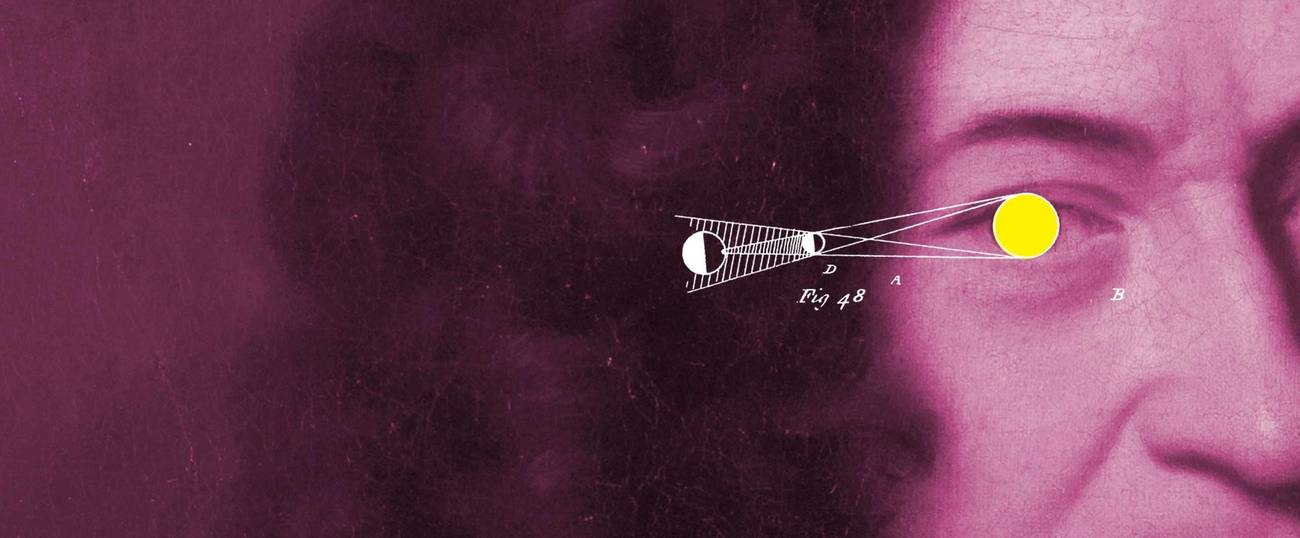A Funny, Empathetic Jewish Genius
Adam Ehrlich Sachs’ ‘brilliant, weird, and profound’ new novel, ‘The Organs of Sense,’ imagines a visionary blind Jewish astronomer in the court of Holy Roman Emperor Rudolf II




At noon on June 30, 1666, a solar eclipse lasting exactly four seconds covered all of Europe in darkness. Strangely, none of the famous astronomers of the day knew it was going to happen. The only person to predict it was an aged Jewish hermit living in an observatory outside of Prague, who watched the stars through the world’s longest telescope, despite the fact that he had no eyes, only empty sockets. Hearing of his prediction, the young scientist Gottfried Leibniz—later to gain fame as the inventor of calculus and one of Europe’s most learned men—made a pilgrimage to the astronomer, hoping to find out whether a blind man could see better than the sighted.
Of course, none of this is true. But as a premise for Adam Ehrlich Sachs’ new novel, The Organs of Sense, it sets just the right tone, somewhere at the intersection of sober science, historical pastiche and lunatic parable. Sachs’ first book, Inherited Disorders, was a satiric collection of very short tales all dealing with the theme of father-son rivalry. It was a funny, acute, and unmistakably Jewish book, announcing a writer of comic gifts. But The Organs of Sense is work of another order—brilliant, weird, and profound, telling truths about the modern condition that most novelists today have forgotten, or never knew. Sachs is still funny, but now with the crazed humor of Thomas Bernhard—slapstick performed on the edge of an abyss.
The Organs of Sense is so unusual that it’s hard to summarize. It has little in common with most contemporary fiction; it’s the kind of book that is likely to attract a narrow but passionate readership. One way of describing it would be to say that its subjects include the rebellion of children against fathers, and the injustices committed by fathers against children; sibling rivalry; the difference between artistic and scientific worldviews; solipsism, or the philosophical belief that I am the only real person in the world; love as a remedy and cause of loneliness; and the way science erodes the distinction between the organic and the mechanical. Yet it’s not at all a ponderous book. In its combination of erudition and wit, it feels like a W.G. Sebald novel rewritten by the author of Candide.
Sachs’ story is filtered through two narrators, as Leibniz relates—ostensibly in an article for a learned journal—a long story told to him by the hermit astronomer concerning events in his own youth, around the year 1604. These events are violent and surreal, featuring a cast of characters who all seem to be mad—most definitely including the astronomer himself, who is a far from reliable narrator. Meanwhile, the framing story keeps up the narrative suspense, as Leibniz and the reader await the approach of the eclipse that will prove whether the astronomer’s prediction is correct, and thus whether the rest of his story deserves to be trusted.
Sachs has chosen the setting of his story deliberately, since the 17th century was an era when the borders between science and magic, reason and fantasy, were not yet firmly fixed. The astronomer’s tale is set at the court of the Holy Roman Emperor Rudolf II, who ruled from Prague around the year 1600. Rudolf’s court mathematician was Johannes Kepler, the first person to accurately state the laws of planetary motion; without Kepler’s work, Newton couldn’t have developed his law of gravity. Yet Rudolf was equally interested in astrologers and wizards like Nostradamus and John Dee, drawing no clear distinction between studying the stars and using them to predict the future. (It’s fitting that Rabbi Judah Loew, the legendary creator of the golem, was also a resident of Rudolf’s Prague.)
The astronomer’s story opens with a dramatic confrontation between the old, magical way of looking at the world and the new, rational one—which also happens to be, in typical Sachs fashion, a confrontation between father and son. When the astronomer was a boy, we learn, his father was court sculptor to the previous Holy Roman emperor in Vienna. But when Rudolf came to the throne, he fired the sculptor, who spent the rest of his life scheming for ways to get his job back. His plan was to make a realistic automaton of a human head, capable of talking and blinking; this gift would win over Rudolf, with his famous love of mechanical oddities.
But just as the sculptor is to present this head to the emperor, his son the astronomer interrupts, announcing that he has invented something even better—not a toy, but the first telescope. (In this version of history, the credit doesn’t go to Galileo.) In despair, his father immediately throws the head into the river and jumps in after it. This parricidal coup launches the young man on a new career as Rudolf’s court astronomer—he has supplanted his father, which according to Sachs is the ambiguous ambition of all children.
The castle the astronomer enters in Prague turns out to resemble the one in Kafka’s The Castle—an eerie place full of arbitrary whims. In particular, the astronomer is drawn into an intrigue involving Rudolf’s son and heir, Heinrich, who is imprisoned in an attic. The reason, it emerges, is that he has gruesomely dismembered a young woman. But does this necessarily prove that he is mad?
In its combination of erudition and wit, The Organs of Sense feels like a W.G. Sebald novel rewritten by the author of Candide.
Here the novel reaches its thematic core. Everyone in The Organs of Sense is somewhat mad, but Heinrich is the most eloquent about what this condition feels like. For one thing, we learn, he has complained for years about hearing a certain unidentifiable sound. To cure it, his father the emperor willingly buys every glockenspiel in the kingdom, hoping to find one that can reproduce the sound. But none ever does, and Heinrich’s affliction comes to seem less like a physical malady than a metaphysical one. How, he wonders, is it ever possible for one person to know what’s going on in the mind of another?
“The problem of getting inside another head, and seeing what that head was seeing (or not seeing) and what it was thinking (or not thinking) now struck Leibniz as a profoundly philosophical problem,” Sachs writes. “Neither cradling it nor cracking it open would do it.” Yet that is just what Heinrich tries to do to the woman he loves—break open her head in order to see what’s inside. That he has to kill her in the process is only an afterthought.
The astronomer is tasked by the emperor with teaching Heinrich trigonometry, so that he can convince other people that he is still in possession of his rational faculties. But the astronomer himself is proof that rationality and madness can coexist in the same person. After all, how can a man with no eyes claim to see the stars or predict an eclipse? Yet Leibniz hesitates to dismiss him, so assured does he sound. Indeed, the astronomer’s madness reveals itself, in Sachs’ hands, as a very modern form of wisdom, one that strives so hard to perceive the nature of reality that it topples into an abyss of doubt.
One of the book’s running jokes is the astronomer’s obsessive demands for ever longer and more powerful telescopes, which he needs in order to make a perfect and complete catalog of the stars. This is a tragicomic ambition, since the reader knows that no 17th-century telescope could possibly see far enough to record every star. Indeed, the astronomer spends so much of the emperor’s money on telescopes that, Sachs jokingly suggests, he is responsible for the popular unrest that caused the Thirty Years’ War. Still, the astronomer is unrepentant: “In science as they pile millions and millions of corpses at your feet you must keep your eyes fixed on the firmament, you proceed as if everyone is already dead, your own family and everyone else also. The most modern scientific methods call for considering everyone in the world to be dead already,” he tells Leibniz. What is modern science but the demand to know the truth even at the price of making our world uninhabitable?
Clearly, The Organs of Sense deals with serious and often abstract topics; but Sachs manages to outwit solemnity. His prose is calibrated at just the right pitch of exaggeration to achieve, like Bernhard’s, an exhilarating absurdity. For Sachs, even seriousness is funny, because it is a kind of obsession, and all obsessions are comic when seen from the outside. It’s only when experienced from within that they become heartbreaking. And The Organs of Sense is best understood as a very elaborate mechanism for inducing that kind of empathy—with the astronomer, with Heinrich, with Rudolf, and with the author who is capable of inventing them all.
Adam Kirsch is a poet and literary critic, whose books include The People and the Books: 18 Classics of Jewish Literature.